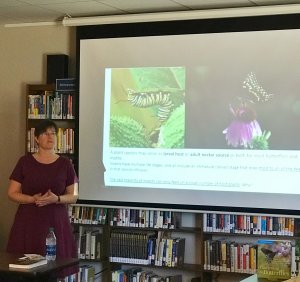 Catherine Duckett, Ph.D., associate dean of the School of Science, delivered a presentation “Why Plant Native Plants?” at the Long Branch Public Library on April 6 in conjunction with the Long Branch Environmental Commission tree seedling giveaway.
Catherine Duckett, Ph.D., associate dean of the School of Science, delivered a presentation “Why Plant Native Plants?” at the Long Branch Public Library on April 6 in conjunction with the Long Branch Environmental Commission tree seedling giveaway.
Duckett discussed the decline in native wildlife in suburban New Jersey and the U.S., highlighting that due in large part to changes in land use and landscaping practices, the song bird and insect populations and species diversity is plummeting.
Further describing the impact of changes in landscaping practices, Duckett described how birds need insects to rear their young to maturity—mostly feeding them caterpillars. These caterpillars are mostly the larvae of native insects that are not evolutionarily adapted to plants used in modern landscaping.
The presentation explained the theory and practice of planting to promote wildlife in New Jersey and gave suggestions of plants that can be used in place of common non-natives such as Forsythia, Norway maple trees and Bradford pear trees, that provide little or no food value for birds to rear their young. Suggestions include oak trees, red maples, coneflowers, and black-eyed susans. The talk also discussed the public health benefits of birds for removing ticks and mosquitoes all year round.
Additional Link
Long Branch Environmental Commission
